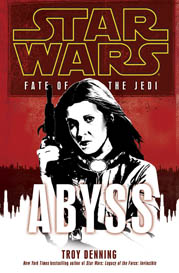The early “Star Wars” novels — “Splinter of the Mind’s Eye” and the “Han Solo Adventures” — followed the lead of “A New Hope,” where adventure was the writer’s main concern. With “Heir to the Empire,” the tone shifted toward political and military maneuvering, and “Star Wars” became associated with those genres even more with the prequel films and “The Clone Wars.”
In “Abyss,” the third book in the “Fate of the Jedi” series, Troy Denning takes the reins of characters who find themselves leading political lives, largely against their will. They lead military lives, too, because that’s the galaxy they’ve been born into — as far as I can tell, the galaxy is always at war. Of course, if there weren’t someone making a power play, there wouldn’t be any “Star Wars” novels.
In this case, it’s Daala, the head of the Galactic Alliance, who decides she wants the Jedi under government control because — as she sees it — Jedi keep turning into Sith under the Jedi Council’s watch. That’s naïve, of course, and we as readers see that a heretofore sheltered group of Sith are emerging into the galaxy. Luke and Ben, still on their journey retracing Jacen’s fall to the dark side, encounter them for the first time in “Abyss.”
Denning gives these Sith typical traits of villains. Vestara — the reader-surrogate Sith character — kind of has a thing for one of her fellow apprentices, yet she won’t hesitate to kill him if that’s what her conniving master asks of her — or so she tells herself. I would’ve liked to have seen Denning do more with this thread, but Vestara still comes off as a rather cold villain.
In the coming Fate of the Jedi books, the authors would do well to remember that a character being powerful isn’t equivalent to a character being interesting. Indeed, Luke didn’t get interesting until he developed a sarcastic streak in recent books. A little more conflict in Vestara’s mind would be welcome.
In addition to politics, “Abyss” serves up mysticism when Luke leaves his body to go on a literal spiritual journey into a lake where he talks to dead people. I’m not sure how much he learns from the experience, but I do know this: “Abyss” is a long way removed from blaster shoot-outs and lightsaber fights — although there is one of those.
Karen Traviss could spice things up by focusing on Mandalorian warriors, who have been added to the mix, but she’s focusing more on “Clone Wars” work at the moment (so far, she’s mostly written Mandos as good guys, even though we’ve been told they will fight for the highest bidder). Instead, we’ll get Aaron Allston in the fourth book, “Backlash,” and that’s fine — he’s one of the best adventure writers in the “Star Wars” stable, not that he can break Fate of the Jedi out of its political, mystical mire.

While I can find points to criticize, I have to admit that I’m totally on board with this series, if for no other reason than the central mystery: Why do young Jedis keep going batty, thinking that everyone they know is an imposter? In “Abyss,” we learn an important clue: All of those who fall ill spent time in the Maw cluster when they were kids.
Another strength: Denning, Allston and Christie Golden (the three authors of this series) are all have nice pacing and humorous dialogue in their repertoires (Denning used to overwrite his big set pieces, but he’s toned that down).
Modern “Star Wars” novels aren’t exactly the “Star Wars” from 1977, but at least the characters are in character, and it always feels like they are making the tonal transition along with the reader. This is the “Star Wars” we’ve come to know in the novels. And that’s OK, too.

